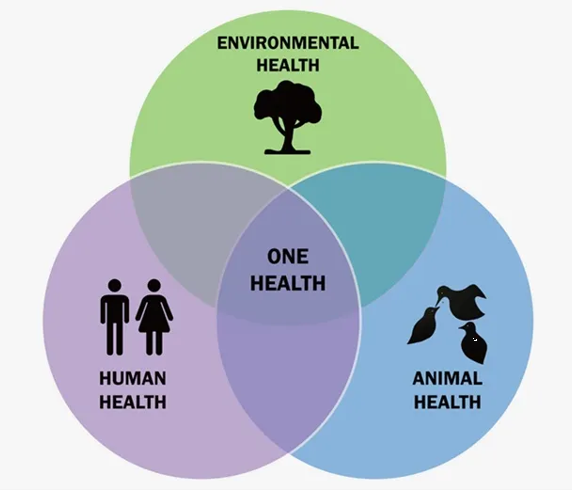By: Rachel Sammar
The concept of One Health, an integrated approach to human, animal, and environmental health, is gaining recognition as a vital framework to address interconnected health challenges. In Pakistan, where agriculture, livestock, and public health intersect within a rapidly evolving ecological landscape, adopting a One Health strategy is increasingly seen as a necessity to combat issues such as zoonotic diseases, antimicrobial resistance (AMR), and food insecurity.
The Need for One Health in Pakistan:
One Health emphasizes collaboration across sectors to address the interdependence of humans, animals, and ecosystems. The relevance of this approach is evident in Pakistan’s unique challenges:
- Zoonotic Diseases: Pakistan is home to endemic zoonotic diseases such as rabies, brucellosis, Crimean-Congo Hemorrhagic Fever (CCHF), and avian influenza. Close human-animal interactions, especially in rural areas, heighten the risks of disease transmission.
- Antimicrobial Resistance (AMR): Misuse of antibiotics in healthcare, livestock, and agriculture has led to a rise in drug-resistant infections, posing a significant public health threat.
- Environmental Degradation: Rapid urbanization, deforestation, and pollution have disrupted ecosystems, increasing the likelihood of emerging infectious diseases.
- Climate Change: Pakistan, one of the countries most vulnerable to climate change, faces rising temperatures, floods, and altered disease patterns, further complicating health challenges.
- Food Security: Livestock, which accounts for 60% of the agricultural GDP, is vulnerable to diseases like foot-and-mouth disease (FMD) and avian influenza, threatening both livelihoods and food supplies.
Collaborative Efforts Needed:
Implementing a One Health framework in Pakistan requires coordination among key stakeholders:
Government Agencies: Collaboration among the Ministries of Health, Climate Change, and Livestock is crucial for effective policy development.
Academic and Research Institutions: Universities play a pivotal role in disease surveillance and evidence-based policy recommendations.
NGOs and International Organizations: Groups such as the World Health Organization (WHO) and Food and Agriculture Organization (FAO) provide technical expertise and funding support.
Private Sector: Pharmaceutical companies and agribusinesses are vital in addressing AMR and ensuring food safety.
Challenges to Implementation:
While promising, the adoption of One Health in Pakistan faces obstacles:
Limited Awareness: Policymakers, healthcare professionals, and the public often lack understanding of the interconnectedness of health systems.
Fragmented Systems: The human, animal, and environmental health sectors operate in isolation, hindering collaboration.
Resource Constraints: Insufficient funding, trained personnel, and infrastructure pose significant barriers.
Cultural Barriers: Traditional practices, such as close contact with animals, contribute to health risks but are deeply ingrained in society.
Opportunities for Progress:
Despite these challenges, Pakistan has opportunities to advance One Health principles:
- Policy Integration: Incorporating One Health into national health strategies, such as the National AMR Action Plan, can drive systemic change.
- Surveillance Enhancements: Technology-driven tools like Geographic Information Systems (GIS) can strengthen disease monitoring.
- Capacity Building: Training programs for healthcare professionals, veterinarians, and environmental scientists can foster interdisciplinary collaboration.
- Community Engagement: Grassroots campaigns can educate communities on hygiene, vaccination, and responsible antibiotic use.
- International Partnerships: Collaboration with global organizations can bring technical and financial support to local initiatives.
Successful Case Studies:
- Rabies Control: Mass dog vaccination programs in Sindh, supported by NGOs and international agencies, have demonstrated the effectiveness of One Health approaches in reducing disease prevalence.
- AMR Surveillance: The Fleming Fund has partnered with local laboratories to improve monitoring and combat antibiotic resistance.
- Dengue Prevention: Integrated vector management in Punjab has combined human health, environmental measures, and community participation to control mosquito-borne diseases.
The Road Ahead:
Experts recommend the establishment of a National One Health Platform to coordinate efforts and ensure cross-sector collaboration. Strengthened policies on antibiotic use, wildlife conservation, and disaster preparedness, coupled with public awareness campaigns, are crucial for long-term success.
Pakistan’s adoption of One Health principles offers an opportunity to mitigate complex health challenges, protect ecosystems, and ensure a healthier future. With strategic investments, interdisciplinary collaboration, and global support, the country is well-positioned to lead the way in South Asia.



Good picturization regarding health